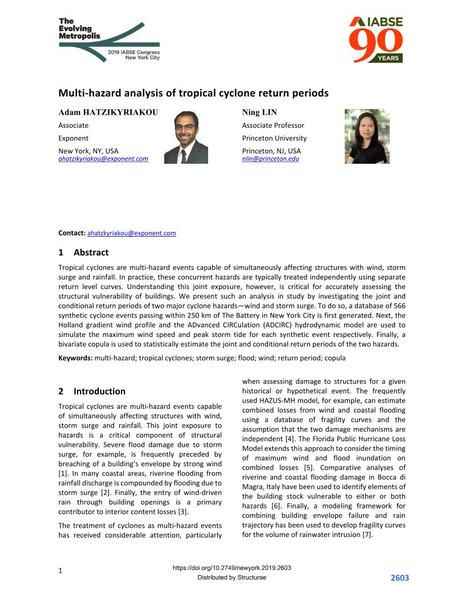Multi-hazard analysis of tropical cyclone return periods

|
|
|||||||||||
Bibliografische Angaben
| Autor(en): |
Adam Hatzikyriakou
(Exponent)
Ning Lin (Princeton University) |
||||
|---|---|---|---|---|---|
| Medium: | Tagungsbeitrag | ||||
| Sprache(n): | Englisch | ||||
| Tagung: | IABSE Congress: The Evolving Metropolis, New York, NY, USA, 4-6 September 2019 | ||||
| Veröffentlicht in: | The Evolving Metropolis | ||||
|
|||||
| Seite(n): | 2603-2609 | ||||
| Anzahl der Seiten (im PDF): | 7 | ||||
| DOI: | 10.2749/newyork.2019.2603 | ||||
| Abstrakt: |
Tropical cyclones are multi‐hazard events capable of simultaneously affecting structures with wind, storm surge and rainfall. In practice, these concurrent hazards are typically treated independently using separate return level curves. Understanding this joint exposure, however, is critical for accurately assessing the structural vulnerability of buildings. We present such an analysis in study by investigating the joint and conditional return periods of two major cyclone hazards—wind and storm surge. To do so, a database of 566 synthetic cyclone events passing within 250 km of The Battery in New York City is first generated. Next, the Holland gradient wind profile and the ADvanced CIRCulation (ADCIRC) hydrodynamic model are used to simulate the maximum wind speed and peak storm tide for each synthetic event respectively. Finally, a bivariate copula is used to statistically estimate the joint and conditional return periods of the two hazards. |
||||
| Stichwörter: |
Wind Überschwemmung
|
||||
